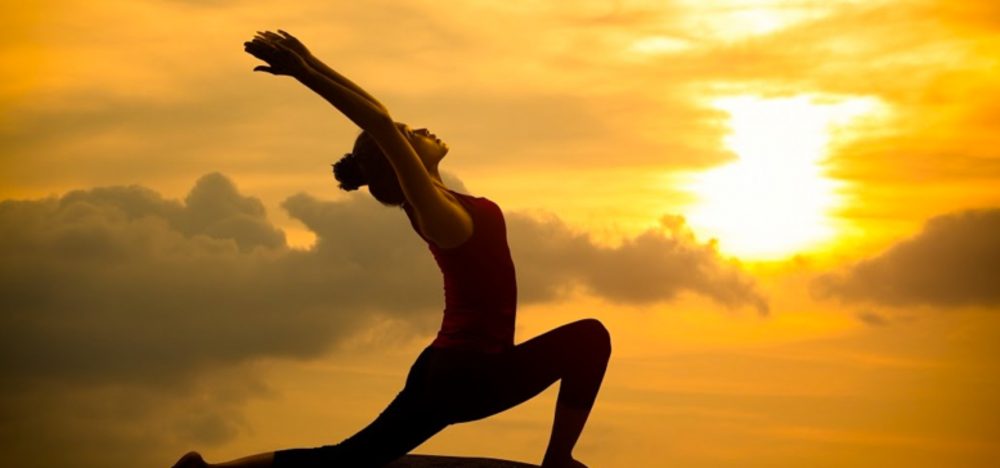My religion isn’t your workout; it has been rooted in my religion for thousands of years as a practice to become one with God and a way to heal our minds, bodies and souls. My prayer beads aren’t your accessories; used for meditation, the purity of my prayer beads don’t make for a nice necklace or bracelet. Om is not a trendy noun for yogis; the sacred sound brings peace to the chanter and is not a name for your company’s students. Yoga is a Hindu practice that cannot be stripped of its identity and given a new history.
My yoga practice began many years ago at a religious Hindu camp, where I would reluctantly wake up at sunrise with the other campers to practice the Surya Namaskar flow, before going straight back to sleep. As a young adult, I gravitated towards yoga, deepening my practice through daily classes and meditating with the help of my grandmother’s mala (prayer beads). I was looking for peace in the hectic life I lived and for the duration of my yoga classes, the world didn’t matter. For 60 minutes everything outside those studio doors came to a pause.
[Read Related: Opening up to Mental Health Help Through the Practice of Yoga]
I didn’t understand the modernization of yoga back then; the yoga boom came after. My studio gave respect to the practice and ensured their instructors did the same. Their appreciation and understanding of yoga stemmed from the fact that it was a lifestyle for them, not just a fad. My ignorance was believing that every teacher, studio and follower would be the same.
When goat yoga came around, I let it go. I even tried the practice, only it turned out to be a gathering of people thrilled to play with goats and take selfies than actually practice yoga. Then came rage yoga, filled with obscenities and alcohol. With words never uttered in religious environments and actions disrespectful to the practice, I thought well hopefully the trend doesn’t last and ignored it as well. Yoga instructors began using prayer beads as accessories and for a third time, I let it go. I convinced myself that they were just plastic beads sold at a store for $5.99. I told myself they weren’t the real thing, they were fake prayer beads and as long as they didn’t mock it, it didn’t matter.
Then came OmStars, yogis turning the sacred sound of Om into a name. Om, a powerful sound used to meditate, find peace and to become one with ourselves is conquered and turned into the title of a company that is the “Netflix for Yogis”. I shook it off, being ignorant is looked down upon, but it is not a sin. A yogi may not understand the foundation of Om. To them, Om might be just a word chanted at the end of class.
Finally came Christian yoga, a practice that uses yoga to spread Christianity and takes it as its own. Bible verses are used to justify this new trend of yoga as a way to become one with their Lord and Savior. They believe yoga postures were founded in biblical scriptures before other religions were created – even Hinduism, a 4,000 year-old religion. Yoga’s true identity became erased and this is something I cannot ignore.
Yoga is one of six major houses of thought in Hinduism, it is derived from the Sanskrit word yug, which means to unite. It has a philosophical and spiritual meaning and is embedded into our scriptures – the Upanishad, Vedas and Bhagavad Gita. Lord Krishna speaks of the four types of yoga in the Bhagavad Gita, bhakti (devotion), jnana (knowledge), karma (action), dhyana (concentration). Us Hindu children grew up chanting Om and hearing stories from these scriptures. Our grandparents told us stories of Sadhus (Sage’s) who live deep in the Himalayas surviving for thousands of years through prayer, meditation and yoga.
Hinduism, one of the oldest religions in the world is where yoga is derived from, with the first mentions of yoga being in our oldest sacred book, the Rig Veda. Without Hinduism, there would be no yoga.
[Read More: Do it for the Culture: Understanding Yoga and Hinduism Beyond the Western Lens]
Westernization plucked out the religious aspects and turned it into a trend, rewriting its manual to fit the masses until finally, yoga became another religion’s practice, reshaping history. I love the fact that parts of my eastern religion are helping people through their lives and providing guidance. It pleases me to see yoga being welcomed with open arms, but that does not mean a group can own it as their own. Its history cannot be forgotten and pushed into the future as pieces of the practice fly off. Practicing yoga doesn’t make you Hindu. It does not mean that you pray to Lord Brahma or believe in a polytheistic religion.
Practicing yoga allows you to become one with yourself. For those 60 minutes, the only thing that matters is the connection you have with your mind, body and soul; the outside world does not exist. But, to lose sight of the foundation is to disregard the spiritual meaning of yoga and that cannot be.
I, as a Hindu, have watched the modernization of my religion for quite some time, but this is where it stops. Our culture welcomes everyone with open arms. We enjoy sharing our religion, food, country and culture, just as the western world shares theirs with us. All that is asked in return is the same thing every culture asks for; understanding and acknowledgment of our practices, including yoga.





